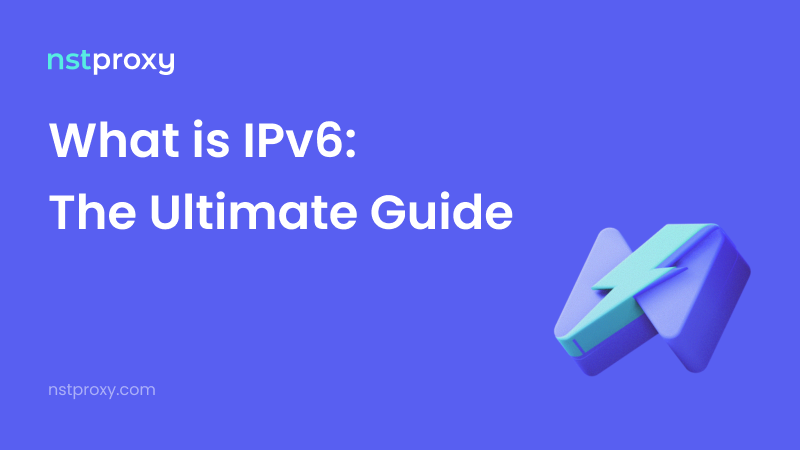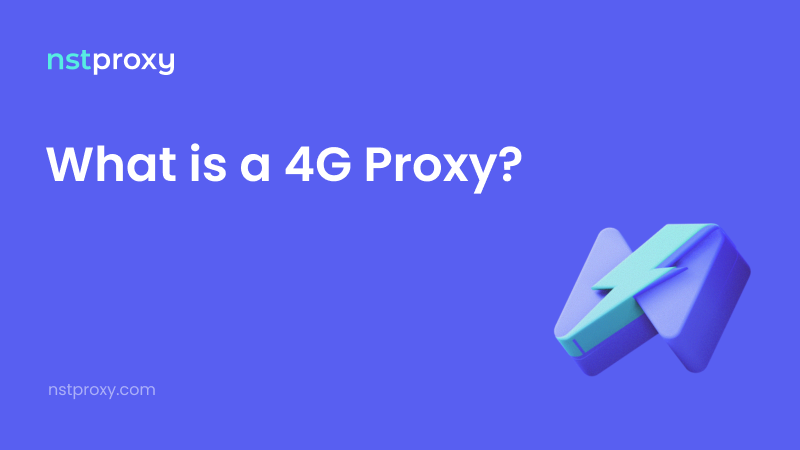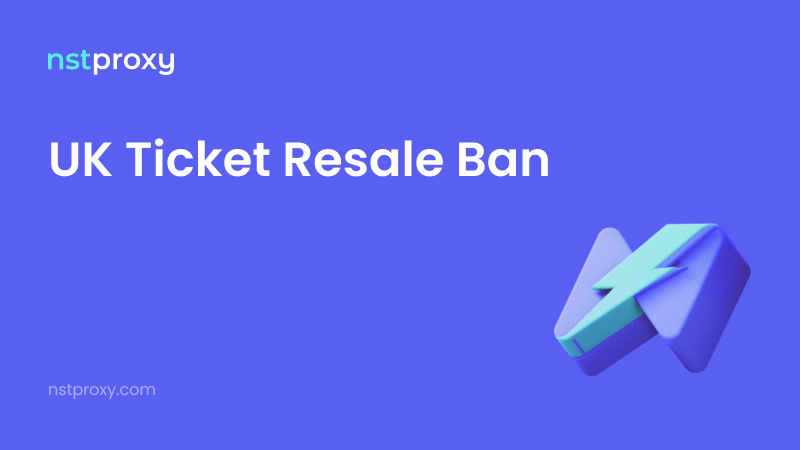IPv6 offers a virtually unlimited address pool, enhanced security, and better support for mobile devices, making the internet more efficient and future-ready. With the exhaustion of IPv4 addresses, businesses, developers, and data-driven teams are quickly shifting to IPv6 proxies to unlock scalability and reliability.
👉 Looking for high-quality IPv6 proxies? Try Nstproxy IPv6 Proxies today.
TL;DR
IPv6 (Internet Protocol version 6) is the successor to IPv4. It expands the address pool from 4.3 billion IPv4 addresses to approximately 340 undecillion (3.4 × 10^38) unique IPv6 addresses. IPv6 improves security, streamlines routing, supports seamless mobile connectivity, and ensures long-term scalability.
If you need IPv6 private proxies, rotating IPv6 proxies, or IPv6 residential proxies, Nstproxy provides reliable, affordable, and high-performance IPv6 proxy services.
What is IPv6?
IPv6 (Internet Protocol version 6) replaces IPv4, solving the shortage of available IP addresses and optimizing the modern internet.
- 1998: IPv6 standardized (RFC 2460).
- 2011: The last IPv4 blocks allocated.
- Today: IPv6 adoption grows worldwide, often supported with IPv6 proxy servers for large-scale automation, web scraping, and SEO tasks.
An IPv6 address example: 2001:0db8:85a3:0000:0000:8a2e:0370:7334
✔️ Shortened: 2001:db8:85a3::8a2e:370:7334
This makes IPv6 addressing more flexible compared to IPv4.
IPv4 vs IPv6: What’s the Difference?
One of the most common questions is: “What is the difference between IPv4 and IPv6?”
| Feature | IPv4 | IPv6 |
|---|---|---|
| Address length | 32-bit (4.3B addresses) | 128-bit (340 undecillion addresses) |
| Format | Decimal, dot notation | Hexadecimal, colon-separated |
| NAT (translation) | Required | Not needed |
| Security | Add-on (optional IPsec) | Built-in IPsec |
| Mobile support | Limited | Optimized for roaming/mobile devices |
👉 Simply put, IPv6 is more scalable, more secure, and better suited for modern devices.
If you’re running IPv6 vs IPv4 comparison tests, you’ll notice IPv6 often provides smoother routing, especially when combined with rotating IPv6 proxies for high-concurrency tasks.
Why Do We Need IPv6?
- IPv4 Exhaustion – 4.3 billion addresses are not enough. IPv6 solves this with its massive space.
- Enhanced Security – IPv6 mandates IPsec, providing privacy and authentication.
- Performance – Simplified headers, no need for NAT.
- Mobility – Perfect for mobile users, IoT devices, and global networks.
- Future-Proofing – Ensures continuous growth of the internet.
💡 Many businesses today choose buy IPv6 proxies as a cost-effective alternative to IPv4, especially when they need millions of IPs for automation.
Types of IPv6 Proxies
When people search for “IPv6 proxy buy” or “buy IPv6 proxies,” they usually look for these categories:
- IPv6 Private Proxies → Dedicated IPs for individual users.
- Rotating IPv6 Proxies → Automatically change IP addresses for scraping or automation.
- IPv6 Residential Proxies → Mimic real user connections for higher trust.
- IPv6 Proxy Servers → Centralized servers offering IPv6 connectivity.
👉 Nstproxy provides all major IPv6 proxy services so you can choose based on your project needs.
Transitioning from IPv4 to IPv6
Since IPv4 and IPv6 are different protocols, they don’t communicate directly. Businesses use:
- Dual Stack – Run both IPv4 and IPv6.
- Tunneling – Encapsulate IPv6 traffic inside IPv4 packets.
- Translation – Convert IPv6 packets into IPv4 format.
For developers, setting up these networks manually can be complex. That’s why IPv6 proxy services like Nstproxy make it easy—you simply configure your bot or software to use an IPv6 proxy server, and the rest is handled automatically.
Why Choose Nstproxy IPv6 Proxies?
- 20M+ IPv6 addresses (static + rotating)
- Residential & Datacenter IPv6 proxies
- Global coverage (195+ countries)
- Support for both IPv4 and IPv6 networks
- Cheap IPv6 proxies (starting from $0.4/GB)
- Rotating IPv6 proxy pools for unlimited sessions
Whether you need IPv4 vs IPv6 testing, IPv6 proxy servers, or residential IPv6 proxies, Nstproxy is the go-to choice.
👉 Start a free IPv6 proxy trial now: Nstproxy Dashboard
Conclusion
So, what’s the difference between IPv4 and IPv6? In short:
- IPv6 is faster, more secure, and future-ready.
- IPv4 still works but is limited.
- IPv6 proxies offer businesses cost-effective solutions for scalability.
With Nstproxy’s IPv6 proxy services, you can leverage rotating IPv6 proxies, buy IPv6 private proxies, or test IPv4 vs IPv6 performance—all in one platform.
🌍 Future-proof your projects with Nstproxy IPv6 proxies today.



